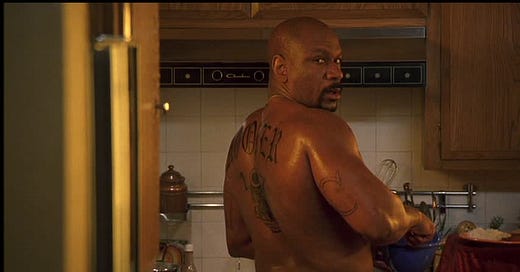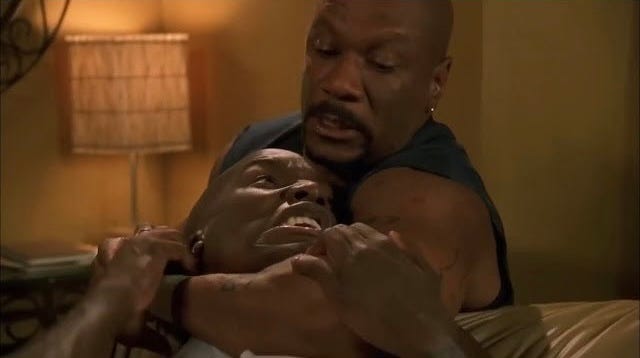In April of 2019, we lost a titan. Acclaimed director and cultural storyteller John Singleton passed on, leaving behind a body of work that shaped a generation. His films—Boyz N the Hood, Poetic Justice, Baby Boy, Higher Learning, Rosewood, and others—are masterclasses in nuance, particularly in how they render Black masculinity. Over the next few days, I’ll be paying tribute by revisiting a few of Singleton’s most unforgettable characters. These are not just roles—they’re mirrors, warnings, teachers, and sometimes even saviors.
Let’s begin with one of my favorites: Melvin, from the 2001 film Baby Boy.
Now, Baby Boy is a dense, layered film that often gets reduced to punchlines or memes (yes, including that infamous naked breakfast scene). But to stop there is to miss the depth Singleton embedded in Melvin, played with a raw, world-weary grace by Ving Rhames.
While the story centers on Jody (Tyrese Gibson), a 20-something man-child hiding behind hollow bravado, it’s Melvin who carries the weight of real manhood—heavy, flawed, unpolished. His masculinity isn’t aspirational in the glossy, politically correct sense—it’s survival-worn, complicated, and unfiltered. Where Jody performs toughness to mask insecurity, Melvin is tough because life demanded it. He doesn’t ask to be respected—he commands it, not with words, but with presence. And that presence forces Jody out of the softness of maternal indulgence and into the hard mirror of his own becoming.
Melvin’s character disrupts the sanitized, middle-class ideal of Black masculinity often held up as the standard. He represents a form of manhood forged in the margins, one rarely affirmed but deeply resonant—especially in a world where Black men are told to follow the rules only to be met with disappointment anyway. Melvin’s path is jagged, imperfect, but undeniably real. And in that rawness, he becomes a model—not of perfection, but of possibility. He shows that Black manhood, even when born of pain and imperfection, is still deeply instructive, still worthy of reflection, still powerful. It’s not despite his flaws that Melvin matters—it’s because of them.
I had a Melvin too.
He was my uncle—a man who oscillated between moments of clarity and years lost to addiction, homelessness, and incarceration. He was never what anyone would call a role model. But even in his struggle, he had insight. When he was sober, he cracked jokes, offered advice, and carried himself with a kind of broken dignity. One summer, just before I left for college, he invited me to work with him patching potholes and repairing sidewalks. I lasted barely thirty minutes on the job before passing out from heat exhaustion and being sent home.
That night, he handed me a crisp hundred-dollar bill and said, “The foreman said to tell you not to come back.” Then he looked me in the eye and added, “I knew you weren’t gonna cut it out there. But I took you out there for a reason. I already ruined my life—I don’t have any options but this kind of work. But you, you’ve got a bright future. You need to be in an air-conditioned room, with your feet under a desk. So when you go off to college, remember—if you fuck up, this is all you’ll be left with.”
Now, I sit in that air-conditioned office with my feet under a desk, and I remember him. I give thanks for the Melvins out there—the unpolished, uncelebrated men who, in their own jagged way, helped raise Black boys into Black men.
Because sometimes it’s not the men we’re told to look up to who shape us. Sometimes, it’s the ones the world overlooks—flawed, loud, honest, and real—who teach us what it truly means to grow up.
Who was your Melvin?
Drop a comment and share your story—and if this moved you, subscribe to stay connected for the next two parts of this tribute series.






🪄✨
I’d love to stay connected in this creative space and would be honored if you’d follow me back too. Let’s grow, write, and heal unapologetically—because this is what community looks like.
https://substack.com/@msmaine/note/p-161257979?r=1t2agi&utm_medium=ios&utm_source=notes-share-action